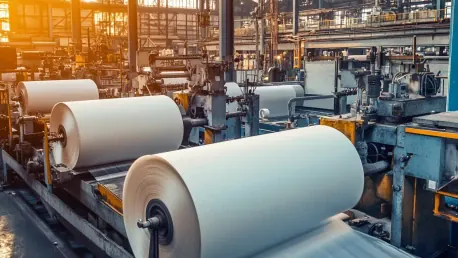The research conducted by Björn Öman, an industrial doctoral student at Karlstad University, aims to make paper manufacturing more energy-efficient, particularly focusing on the energy-intensive nature of producing grease-proof paper. This type of paper, known for its compact and impermeable barrier against fat, grease, and water, poses significant challenges during the dewatering process. Öman’s findings, published in BioResources, have the potential to revolutionize the paper manufacturing industry by offering a novel approach to reducing energy consumption without compromising the quality of the end product.
The Challenges of Dewatering in Paper Manufacturing
The Complex Process of Dewatering
The complexity of the dewatering process in paper manufacturing arises mainly from the need for the paper to pass through several vacuum suction boxes. Typically ranging from five to eight boxes, this process often leads to rewetting, where the paper reabsorbs some of the water that has just been removed. This back-and-forth not only increases energy consumption but also complicates achieving the desired dryness level for grease-proof paper. This type of paper requires a particularly stringent dewatering process due to its compact nature, designed to act as a barrier against fat, grease, and water.
Researchers, led by Öman, focused on capturing the intricacies of this multifaceted process through laboratory-scale tests. They simulated a multi-slit vacuum suction box scenario and found that applying increasingly higher vacuum levels without breaks between stages could yield significantly better results. By doing so, the team was able to reach higher dryness levels, thereby consuming less energy. Their experimental approach of continuous high vacuum levels yielded promising results, suggesting that traditional methods might be improved to save both energy and cost on a larger, industrial scale.
Laboratory Findings and Implications
The lab tests were not merely theoretical exercises but offered practical, actionable insights for real-world applications. One of the core findings was that higher dryness levels were achievable at a lower energy cost when continuous high vacuum levels were applied. This contrasts sharply with traditional methods that necessitate multiple stages with breaks in between, causing inefficiencies. These findings represent a significant breakthrough not just for grease-proof paper but potentially for other types of paper as well.
The implications of these findings are far-reaching, with potential to impact the entire paper manufacturing industry. By adopting more energy-efficient dewatering methodologies, manufacturers could lower their operational costs while also contributing to environmental sustainability. This is particularly important as industries worldwide face increasing pressure to adopt eco-friendly practices. The successful application of these techniques on a laboratory scale is a promising indicator of their viability in full-scale production environments, highlighting the necessity of ongoing innovation and adjustment in manufacturing processes.
Sustainable Solutions for the Future
Industry Trends and Sustainability
The research aligns with an overarching trend in various manufacturing sectors: the pursuit of sustainability and energy efficiency. Industries across the board are increasingly focusing on optimizing their processes not only for cost savings but also for reducing their environmental footprint. The paper manufacturing industry, given its substantial energy requirements, stands to benefit greatly from such innovations. Öman’s research underscores the critical need for continuous improvement and adaptation in industrial processes to keep pace with evolving sustainability goals.
Sustainability in manufacturing has evolved from being a buzzword to a tangible goal for many companies. It involves an intricate balance between maintaining product quality and minimizing resource consumption. Öman’s research on improving the dewatering process for grease-proof paper illustrates how targeted innovations can lead to substantial gains. By focusing on specific pain points within the process, such as the energy-intensive dewatering stages, manufacturers can pave the way for more eco-friendly production methods.
Future Prospects and Industry Feedback
Björn Öman, an industrial doctoral student at Karlstad University, conducted research to enhance the energy efficiency of paper manufacturing. His work particularly targets the energy-intensive production of grease-proof paper, which is known for its dense and impermeable nature that effectively blocks fat, grease, and water. The manufacturing process of this type of paper involves significant challenges, especially during the dewatering phase, which requires substantial energy input. Öman’s research, as detailed in his publication in BioResources, has the potential to bring about significant advancements in the paper manufacturing industry. His innovative approach aims to reduce energy consumption while maintaining the high quality of grease-proof paper, thereby offering a more sustainable method of production. By focusing on improving energy efficiency, Öman’s findings could lead to both economic and environmental benefits for the industry, potentially revolutionizing how grease-proof paper is manufactured without compromising its essential properties.









